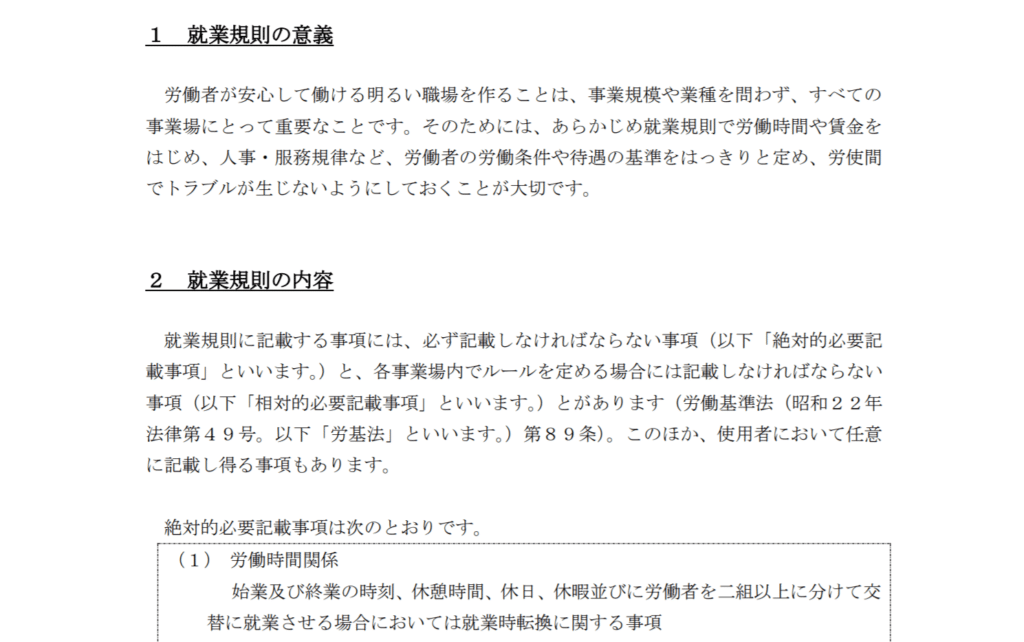What are the Company Work Rules that Should be Reviewed in Recognizing Side Business Systems?

Traditionally, in Japanese companies, it was common for side jobs to be prohibited. However, under the influence of initiatives such as “Work Style Reform”, even major corporations are gradually lifting the ban on side jobs. It was also a topic of discussion when the prohibition on side jobs was removed from the “Model Employment Rules” published by the Ministry of Health, Labour and Welfare in 2018 (Heisei 30). Given the current trend of relaxing restrictions on side jobs, we will explain the key points of employment rules to avoid trouble when allowing employees to have side jobs.
Prohibition of Side Jobs in Employment Rules
For a long time after World War II, traditional Japanese corporate practices such as seniority-based promotion, lifetime employment, and mandatory retirement have encouraged companies to maintain their employees’ employment. Conversely, employees have been prohibited from engaging in side jobs outside of their primary place of work.
In the following, we will explain the prohibition of side jobs, which has traditionally been stipulated in the employment rules.
What is the Prohibition of Side Jobs Provision?
The prohibition of side jobs provision refers to a rule in the employment regulations that prohibits employees from having a side job.
The content of the prohibition of side jobs can vary. It can completely ban any work outside of the company, or it can effectively ban side jobs by setting high requirements for approval, such as requiring approval from the board of directors even under a permission system.
However, as long as side jobs are performed outside of working hours, they should essentially be a matter of how employees use their private time and should be freely allowed in principle.
Therefore, just because there is a provision prohibiting side jobs in the employment regulations, it does not mean that employees’ side jobs can be completely banned. In fact, there are several court cases that have denied the effectiveness of the prohibition of side jobs provision in cases where there is no rational reason to ban side jobs.
What is a Side Job?
A “side job,” which falls under the prohibition of side jobs, refers to work done outside of one’s main job. For example, working part-time at a convenience store in the evening after finishing your main job, or continuously helping out with a friend’s company’s work and receiving compensation, are generally considered side jobs.
On the other hand, investing is usually not considered a side job because it is different from a business. The side jobs that are subject to the prohibition of side jobs are thought to be limited to actions that earn income through labor. For example, stock investment and real estate investment are considered passive income, and are not considered to be subject to the prohibition of side jobs.
Reasons Why Companies Have Prohibited Side Jobs
The main reasons why Japanese companies have prohibited side jobs in the past are as follows:
- There is a risk that employees may become fatigued from working outside of their regular hours and neglect their primary job duties.
- There is a risk of leakage of the company’s trade secrets.
As mentioned above, if a lawsuit arises over the validity of a company’s prohibition on side jobs, the key point is whether there is a rational reason for the prohibition. If the reasons listed above are recognized as the purpose of the prohibition, it is more likely that the court will acknowledge the rationality of the prohibition.
Neglecting Primary Job Duties Due to Side Jobs
For example, if you work part-time until late at night after finishing your main job, you may not be able to get enough rest before the start of your workday. As a result, it is entirely possible that you may be late for the start of your main job or that you may not be able to perform adequately due to lack of sleep.
Risk of Leakage of Trade Secrets
The leakage of a company’s trade secrets is a very serious issue for the company. If the side job is a part-time job at a convenience store, for example, it is unlikely that trade secrets will be leaked.
On the other hand, if you are helping out at a friend’s company and that company’s business competes with your main job, there is a risk of leaking customer lists or information about new business ventures.

For more details on the removal of trade secrets, please refer to the following article.
https://monolith.law/corporate/trade-secrets-unfair-competition-prevention-act[ja]
For more details on changing jobs to a competitor after leaving a company, please refer to the following article.
The Benefits of Allowing Side Jobs
Historically, Japanese companies have prohibited side jobs due to the potential disadvantages. This was largely accepted because companies guaranteed lifetime employment, ensuring that employees would not struggle financially until retirement, even without a side job.
However, in recent years, employment fluidity has increased, and traditional employment practices such as lifetime employment are breaking down.
Against this backdrop, the government has shifted its policy towards promoting side jobs as part of its “Work Style Reform”. Progressive companies, particularly in the IT sector, are beginning to lift the ban on side jobs.
The increase in companies allowing side jobs is partly due to the growing recognition of the benefits of doing so, such as:
- Acquiring skills not available in the main job through side jobs
- Preventing the outflow of excellent talent
Acquiring Skills Not Available in the Main Job Through Side Jobs
The scope of a main job is usually limited, so there are always tasks that cannot be experienced within the company. Until now, the only option for employees wanting to acquire new skills was self-study.
However, it is preferable to gain skills such as IT through actual work experience rather than self-study using books or the internet.
In such cases, by lifting the ban on side jobs, employees can acquire knowledge and skills not available in their main job. This not only satisfies ambitious employees but also allows the company to benefit from the skills acquired through the side job.

Furthermore, by exposing employees to the culture of a different company through a side job, it can stimulate them and lead to innovation in their main job.
Preventing the Outflow of Excellent Talent
In IT companies, securing excellent talent is extremely important. As mentioned above, excellent talent tends to be ambitious and wants to acquire new skills. If side jobs are allowed, these talented individuals can choose to work at other companies to improve their skills without having to leave their current company.
Therefore, by allowing side jobs, companies can avoid situations where excellent talent is forced to resign.
Key Points When Allowing Side Jobs in Employment Rules
Even when allowing side jobs, it is necessary to establish certain rules in the employment regulations. In this article, we will explain the key points to consider when allowing side jobs in employment rules.
Provisions of Employment Rules Regarding Side Jobs
As mentioned earlier, side jobs are essentially free, so if there are no provisions prohibiting side jobs in the employment rules, it means that side jobs are allowed. However, as we have seen before, employees’ side jobs pose certain risks to the main job’s company, such as leakage of corporate secrets.
Therefore, it is desirable to establish rules in the employment regulations for conducting side jobs in order to avoid risks as a company and to allow employees to have side jobs.
The following model clause published by the Ministry of Health, Labour and Welfare (Japanese Ministry of Health, Labour and Welfare) can be used as an example of provisions in employment rules regarding side jobs.
Article 68 (Side Jobs and Concurrent Jobs)
1. Workers may engage in the business of other companies, etc. outside of working hours.
2. When engaging in the business of the preceding paragraph, workers shall submit a predetermined notification to the company in advance.
3. If engaging in the business of paragraph 1 falls under any of the following items, the company may prohibit or restrict it.
① If there is a hindrance to the provision of labor
② If corporate secrets are leaked
③ If there are acts that damage the company’s honor or credit, or destroy the relationship of trust
④ If the company’s profits are harmed by competition

As stated in the second paragraph of the model clause, it is common to adopt a prior notification system as a method of allowing side jobs.
When adopting a notification system, employees can engage in side jobs as long as they submit a notification, and unless they fall under certain predetermined circumstances as stated in the third paragraph of the model clause, the company cannot judge the appropriateness of side jobs at its discretion.
Thus, the notification system is significantly different from the permission system, where the company can judge the appropriateness of side jobs at its discretion, and it can be said that the notification system is in line with the purpose of allowing side jobs.
Therefore, when adopting a notification system, it is necessary to clearly stipulate in advance the cases where side jobs cannot be performed, as in the third paragraph of the model clause. If such a clause is not present, it will not be easy to make an employee quit a side job when a notification of a side job is received from the employee.
Management of Working Hours
One of the challenges when allowing side jobs is the management of employees’ working hours. According to the Labor Standards Act (Japanese Labor Standards Act), if the total time of the main job and the side job exceeds the statutory working hours, overtime pay must be paid.
The burden of overtime pay falls on the business operator who later concluded an employment contract or the like with the employee, so it is often the case that the side job company should bear it. However, if the main job company orders overtime work while recognizing that overtime pay will be incurred due to the total working hours of the side job, the main job company will have to bear the overtime pay.
In any case, as a main job company, it is required to grasp and manage the working hours of the side job.
Summary
With the government’s policy of lifting the ban on side jobs, it is expected that more companies will allow side jobs in the future. However, many of the current labor laws are based on the premise that no side jobs are performed, so when actually lifting the ban on side jobs, a considerable amount of labor management, including the management of working hours mentioned in the article, is necessary.
Therefore, when considering lifting the ban on side jobs, it is necessary to fully prepare not only the provisions of the employment rules, but also the labor management system.





















